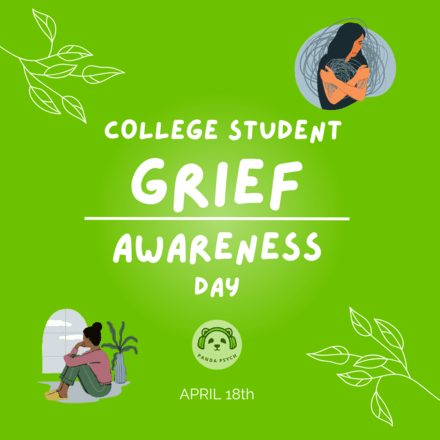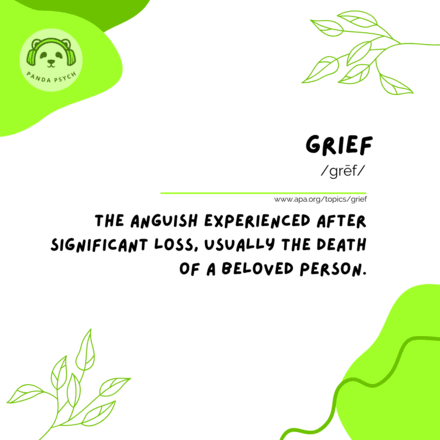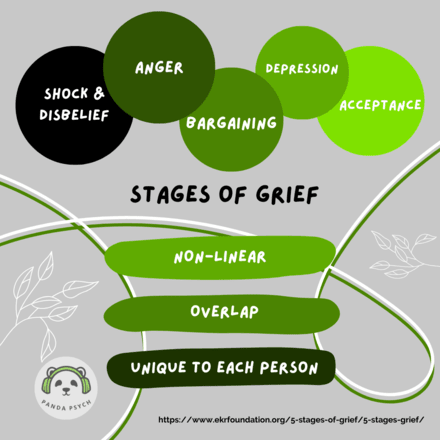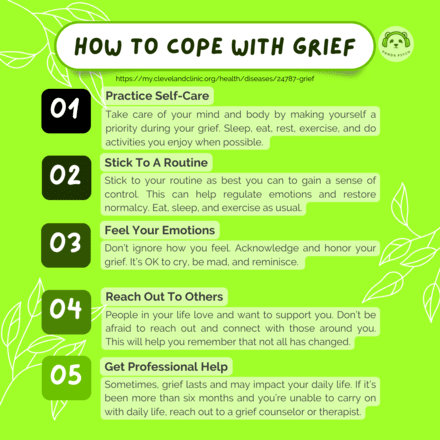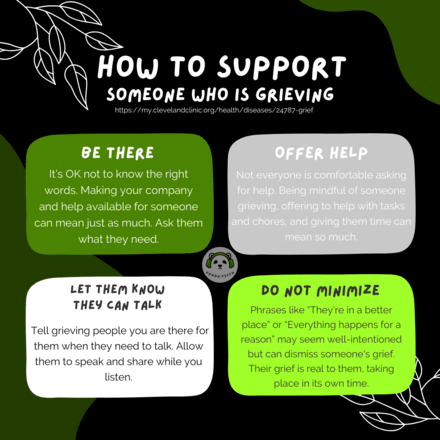Navigating College Grief: Understanding and Supporting on College Student Grief Awareness Day
Grief touches us all. Whether it is the loss of a loved one who has passed, the loss of a relationship or friendship, the loss of a pet, the loss of health, or grief over what could have been, we will deal with grief in some way. There are many ways to deal with grief, and there is no right way to grieve. It’s a messy, personal process.
I know that I’m preparing to go through the grief of my grandfather passing away as he is dealing with Alzheimer’s. There’s the grief of the person he once was before the disease and then anticipating the loss of his life. This type of grief is ambiguous as he is still alive, but he is not the person I once knew. As a graduate student, I want to prepare with tips and resources in case I need them when the time comes, not only for myself but also for my family.
Today’s post will focus on college students, how grief affects them, ways to cope healthily, and resources for those who need support. However, the information can also apply to others who aren’t college students.
All links are for reference and educational purposes only. No commissions and revenue are made.
Disclaimer: I am not a licensed mental health professional or psychologist. Any information is intended for educational purposes, and it is strongly encouraged to seek professional help if needed. If you require emergency assistance, call or text 988 or visit 988lifeline.org/chat to reach a crisis counselor for support.
What is College Student Grief Awareness Day?
AMF logo from https://healgrief.org/actively-moving-forward/
College Student Grief Awareness Day was first celebrated in 2015 by the once-named National Students of Ailing Mothers & Fathers Support Network, now Actively Moving Forward(AMF). This day seeks to support college students dealing with grief related to a loved one afflicted with an illness or the death of a loved one.
Actively Moving Forward was started in 2004 by David Fajgenbaum, MD, after the loss of his mother, Anne Marie Fajgenbaum, as a result of a brain tumor. As of 2017, it is now a HealGrief program that continues to support young adults grieving loved ones’ illnesses or deaths. They have campus chapters with support groups for college students to speak with peers and share experiences. They also provide non-college students with information, programs, and community.
College students can often feel alone in their grief, and they may be away or not have supportive family and friends. That’s why AMF offers an app that allows you to connect with others and access tools and resources from your phone, virtual support groups, and grief coaching for those aged 18 to 30.
What is Grief?
Grief is a response to the loss of something important to an individual. This can be a loved one passing away, a loss of a relationship, or loss of what could have been regarding your life or health. It is also a highly individual process that may not look the same from person to person. The progression of grief can also involve times of recovery with times of regression, as the process of grief is nonlinear.
Bereavement can often be used interchangeably. However, bereavement refers to the state of loss rather than the reaction to loss.
The Kübler-Ross Model indicates the five stages of grief, but it is important to note that these stages are loose in how they can occur. The timeline of each stage can vary, and many stages can overlap with others. The model doesn’t reflect a complete study of grief and bereavement. It was meant to discuss some key reactions people experience when losing a loved one.
The Five general Stages of Grief apply to all forms of grief:
Denial—This first stage is typically short-lived. People do not want to believe what is happening or that it is happening, and productivity and thinking can dip. Some may stay in denial for a long time, which can result in losing touch with reality.
Anger—After realizing what has happened and how real it is, they may get angry and want something or someone to blame for this loss. For example, they may lash out at other loved ones or place blame on systems such as healthcare or the economy. Irritability, frustration, and short-temperedness are all common during this stage.
Bargaining—As anger subsides, someone may start thinking of ways to postpone the inevitable. Religious and spiritual people may reach out to a higher power to bargain their behavior to improve the situation or to feel better. People also may ruminate over the “what ifs” and “should haves” that could have changed the outcome of whatever loss occurred.
Depression - In this stage, a person may feel sad, fear, regret, guilt, and other negative emotions related to the loss they have experienced. They could give up on life and only see life as a dark place, often leading to indifference, being a recluse, pushing others away, and not exhibiting excitement about anything. They may also experience a loss of trust in God if they are religious. Low energy and lack of motivation are also common signs.
Acceptance - This stage is where the realization that change is or has come to their life and that fighting this change will not make their grief go away. People will accept the fact that they have lost their loved one, lost their pet, lost their job, or anything else that they have lost completely. It may not be a happy acceptance, but it will allow them to move on and embrace the change. This doesn’t mean they don’t still feel the pain of loss, but they can integrate themselves back into life.
“The five stages – denial, anger, bargaining, depression, and acceptance – are a part of the framework that makes up our learning to live with the one(s) we lost. They are tools to help us frame and identify what we may be feeling. But they are not stops on some linear timeline in grief.” - Dr. Elisabeth Kübler-Ross
Treating yourself with kindness and compassion while you are grieving is essential. You can experience various emotions and reactions, such as shock and disbelief, sadness, guilt, anger, fear, and physical pain.
How To Cope With Grief?
When coping with grief of any kind, it’s important to remember that it takes time and patience. There are some ways to help you ease the pain, cope with the loss you are experiencing, or to support someone who you know is grieving.
Practicing Self-Care | Self-care while grieving is essential for your mind and body. Making yourself a priority by getting adequate sleep, eating nutritious meals regularly, practicing yoga, getting outside, and engaging in activities you enjoy are all ways to take care of yourself. Grieving can take a hefty toll on your mind and body if you aren’t taking the time to take care of yourself whenever possible. Here are some other ways you can practice self-care.
Sticking To A Routine | When experiencing grief, your routine can be interrupted, and feelings of normalcy can be disturbed. By sticking to a routine, emotions can be more easily regulated, and some sense of normalcy can be restored after loss. Often, a sense of control can be lost when going through grief, so having a sense of predictability with regular eating, bathing, and completing tasks can help restore that sense of control in your life. Allow time in your routine for any self-care, and be mindful of what you feel you can handle.
Feel Your Emotions | You may feel like ignoring any emotions that arise while dealing with grief, but this can be detrimental to your mental health over time. It’s important while grieving to allow yourself to feel your emotions and to acknowledge those emotions. It’s OK to cry, it’s OK to be mad, it's OK to reminisce. Find ways to express your feelings outwardly through journaling, telling stories, listening to music, or creating artwork. Don’t be afraid to contact someone if you need to talk.
Reach Out To Others | Keeping connected to those still around or in your support system can help you cope with the grief. It’s OK to allow alone time, but it’s also important to not isolate yourself. Not everything has changed in your life due to your loss. It may not feel like it, but people love you and want to support you in your time of need. You aren’t a burden.
Get Professional Help | Sometimes, grief requires talking to a professional. A grief counselor or therapist can help you manage your grief if it’s interfering with your life and relationships or has been lasting more than six months. Grief can take time to recover from, but the longer it goes on, the more help you may need. Don’t feel ashamed to reach out to a professional. They are here to help you.
Some examples of how to support someone who is grieving are:
Be There | You may not be a grief expert or have the “right” words, but being there for grieving people can mean so much. This can mean being available and asking what their needs are. Do they need a break? Do they need help with a task? Would they like a distraction? Ask them what they need and do your best to be available.
Offer Help | Sometimes people don’t feel comfortable asking for help, so being mindful of those who are grieving and offering to help with daily tasks, any arrangements, or other ways to help make their day less daunting can be helpful. Offering and volunteering your time unprompted can help grieving people feel supported and not like a burden for having to ask for help. Offer to take the kids to school or on an outing to give them time to themselves. Offer to get groceries for them. Bring over meals and help clean their house. All of these examples are ways that people can be there for others.
Let Them Know They Can Talk | Don’t be afraid to bring up a loved one who has passed or the situation bringing them grief. They may want to talk about their feelings and thoughts but are waiting to know whether they can. They may feel more comfortable processing their emotions by letting them know you are here to talk it out with them. Let them share what stories and feelings they want, but do your best to listen more than talk.
Do Not Minimize | When someone does share with you about their grief, be sure not to minimize their loss by saying how they should be over it and that it wasn’t a big deal. Emotions and feelings are highly personable and are real to someone. Phrases that are well-intentioned and positive may result in the person feeling invalidated in their feelings. For example, “They’re in a better place now” or “Everything happens for a reason” can sound dismissive to those who open up. Please encourage them to honestly share and remember that it’s OK not to know what to say. Being there is what is important.
